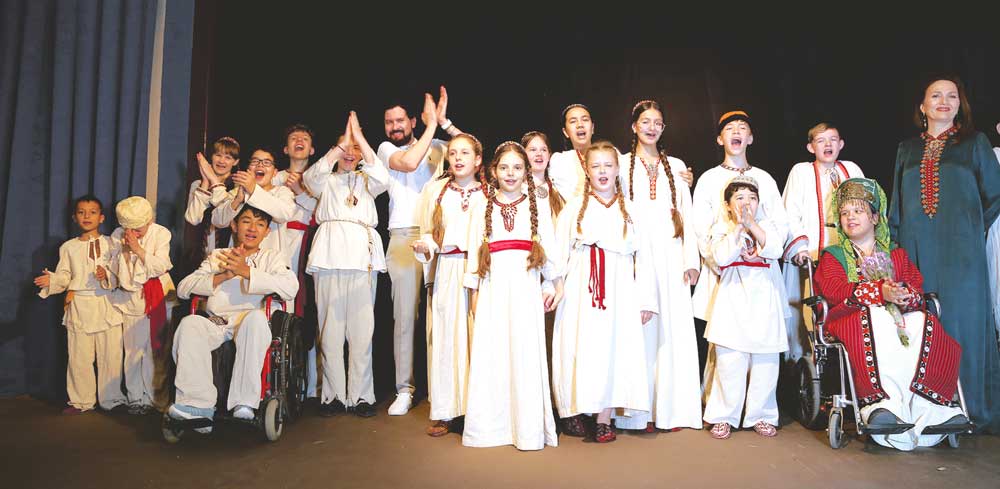Irina Kuliyeva
The principle of leaving no one behind, a cornerstone of the UN’s 2030 Agenda for Sustainable Development, guides Turkmenistan’s social policies. By focusing on people with disabilities and special needs, the country strengthens social protections and fosters their integration into society.
This commitment comes alive at the Pushkin Russian Drama Theater’s inclusive children’s studio in Ashgabat. Here, the gap between children with and without disabilities disappears entirely. Their recent performance, “Japbaki,” based on the work of Turkmen writer Berdi Kerbabayev (who would have celebrated his 130th birthday this year), exemplifies this beautifully. The premiere of this unusual performance was held to a full house. The inclusive production was performed by the actor of the Pushkin Theater Andrey Pavlov.
Japbaki… Jokers and wits – they have become heroes of Turkmen folklore. Funny and instructive stories have been told about them and the film “Naughty Brothers” has been shot, which has been popular among teenagers since the seventies of the last century to this day. It is symbolic that at the premiere of the play by the inclusive children’s studio, Ashir Djumadurdiyev was among the honored guests, who played the role of the younger brother Topbak in the film.
Andrei Pavlov’s innovative production of “Japbaki” is a modern take on a classic fairytale. It offered children a unique experience, immersing them in the world of theatre and fostering collaboration with renowned artists. Working alongside famous actors like Pavlov and Tatyana Ovezmuradova, decorators Tatyana Prodan and Lyudmila Mikhailova, and choreographer Tatyana Udovichenko, the young cast brought the story to life with vibrancy and dynamism. Their genuine enthusiasm captivated the audience, perfectly capturing the spirit of the playful Japbak brothers.
“Japbaki” wasn’t chosen by accident – it’s a story by and for teenagers, perfectly matching the age range of the inclusive children’s studio (7-17 years old). To ensure everyone participated, two casts were formed for the eight main roles. The mischievous Japbak brothers were brought to life by Matvey Gulyanitsky, Makariy Shapovalov, Nikon Kozlov, Andrey Filipchenko, Ismail Sakhedov, Daniil Beslekoev, and Mustafa Yagshiev. Juliana Kostina and Aileen Kazimova shared the role of Shirinjamal, while Stanislav Demidovsky and Yusup Yagshiev played Kelek Bai. Maksim Kostin delivered a strong performance as Melegez. The roles of fellow villagers of the Japbaks were performed by their friends, they improvised the life of the village where the brothers lived.
The preparation for the play took six months and everything was like in a real adult theater. Rehearsals focused on core theatrical skills like stage presence, movement, acting, and improvisation. The director excelled at nurturing each child’s talent, particularly those with disabilities, by providing opportunities for self-expression on stage. So, for young actors Jennet Mehdiyeva, who played the role of Doyduk Eje, and the narrator of the play Arslan Byashimov, the stroller became an interesting way to achieve an emotional effect, a special road to the audience’s heart.
The play wouldn’t have been as heartwarming without the combined talents of all the young actors. For some, it was their first time working alongside peers with disabilities. This collaboration fostered a powerful message of inclusion and individuality. The children learned that everyone has unique strengths, and by working together and supporting each other, they could achieve success results.
Backstage after the performance, a celebratory atmosphere buzzed. Congratulations were exchanged, photos snapped, and pure joy radiated from the children. Their involvement in this grand production brought them immense happiness. The success of the performance, the feelings and emotions that captured the children, the director of the play Andrei Pavlov and the head of the inclusive children’s studio Tatyana Ovezmuradova, gave both children and professional artists the desire to make more than one performance.
The main thing is to set high goals and raise the bar every time. The guys should be sure that each of them will succeed and even the most seemingly impossible dreams can come true.
The essence of inclusion is that every child can enrich a school class or another team, such as a theater studio, with their unique perception of the world, their contribution to joint projects and improve the mutual understanding of children with the world of other people, so that the hearts of all children burn with warmth! Different, but equal opportunities to realize oneself is one of the signs of modern society. ///originally published by Neutral Turkmenistan newspaper, 2 May 2024 (Photo credit – Ashir Geldybayev)
